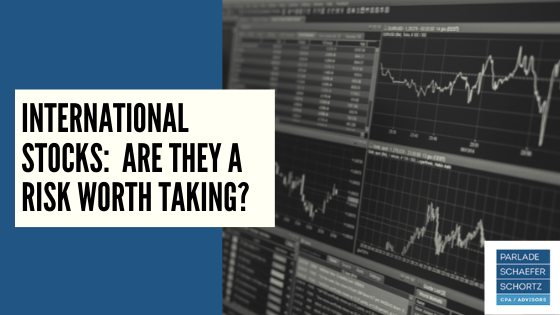International Stocks: Are They a Risk Worth Taking?

When it comes to investing it is repeated over and over the importance of diversifying to reduce the risk of major losses. BUT, to what extent should one diversify? Should diversifying include stepping outside the U.S. to invest in foreign markets? AND, how do foreign investments stack up against U.S. investments?
The U.S stock exchanges are seven times larger than any other market. According to
2021 stats, the combination of NYSE’s and NASDAQ’s equity market capitalization is at 50 trillion dollars. The second largest world market is China at 7.6 trillion, followed by Europe Euronext at 7.3 trillion.
While there are no players in the global realm that are as sizeable as the U.S. stock exchanges, this doesn’t mean foreign investments don’t have a place in your portfolio.
We’ve all heard to diversify our portfolios with different stocks, investments types, but should this extend to different markets altogether? Looking at historical performance the average US
stock gain is 9.9% and the average of all other global markets combined from 1986 to 2018 is 6.6%.
Looking at averages over roughly the past 4 decades the U.S. has outperformed foreign markets. However, looking at individual years the better return rate fluctuates between U.S. investments and foreign ones.
Historically between the years 1970 to 2008
a portfolio with 80% U.S. investment and 20% foreign investments had better returns than a 100% U.S. only portfolio. While this doesn’t make success a guarantee it does demonstrate the possibilities and potential advantages of participating in global markets.
Disadvantages to Foreign Investing
Drawbacks to consider with foreign investing is they typically cost more to own, currency exchange rates fluctuate and will influence the value of your investments, and they may generate greater tax. However, the tax disadvantages can be altogether avoided by placing international stocks in retirements accounts or offsetting with international tax credits. Additionally, it’s wise to be familiar with a country’s political affairs and turmoils before moving forward.
Contrasting Opinions
Opponents advising against foreign investing believe the US is large and powerful and will continue to outperform other countries, and therefore is the better investment.
In contrast, foreign investing proponents make a solid argument that foreign markets have different fluctuation patterns to help reduce impacts from fluctuating US market trends.
Additionally, newer foreign markets have greater growth potential creating a possibility for highly lucrative long-term investments.
Conclusion
Ultimately you have to decide which viewpoint you resonate with most strongly, but looking through historical performance short term investing in foreign markets is a gamble, but including a mix of foreign investments in a long term investment strategy has historically demonstrated greater gains than U.S. only investments.






